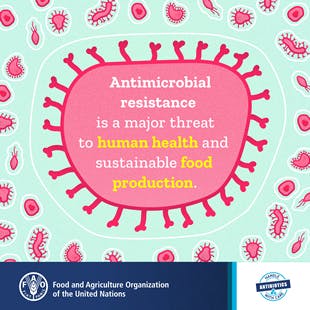As the world marks Antibiotic Awareness Week during the week of November 13, more and more governments, corporations, nonprofits, and academic institutions are acknowledging the urgent need for swift, collaborative action to tackle antimicrobial resistance (AMR). Misuse and abuse of precious antibiotics has accelerated the rise of drug-resistant infections – so-called superbugs – jeopardizing global health by making formerly harmless ailments potentially deadly.
But the effort to stop AMR, which already kills 700,000 people each year, goes beyond doctors’ offices, pharmacies, and research labs. It stretches to veterinarians and farms, where widespread use of antibiotics in food-producing animals like cows, chickens, and pigs is accelerating the problem.
Global diets are evolving, boosting the demand for meat, dairy, and eggs, subsequently increasing antibiotic use in animals to promote growth and stave off disease. In some countries, around 80% of total consumption of medically important antibiotics is in livestock. Staggering statistics like that have prompted the World Health Organization (WHO) to make recommendations to stop antibiotic use in animals, in an effort to preserve precious drugs essential to human medicine. Healthy animals should only receive antibiotics to prevent disease if an illness has been diagnosed in other animals in the same flock, herd, or fish population, according to WHO. Sick animals should be tested to determine the most effective treatment, which should be limited to those drugs least important to human health.
“A lack of effective antibiotics is as serious a security threat as a sudden and deadly disease outbreak,” says Dr. Tedros Adhanom Ghebreyesus, Director-General of WHO. “Strong, sustained action across all sectors is vital if we are to turn back the tide of antimicrobial resistance and keep the world safe.” This concept, known as a “One Health” approach, recognizes that human well-being is inextricably tied to the health of animals and the environment, and that scientific collaboration across disciplines is essential to a healthy world.
The Tripartite of WHO, the Food and Agriculture Organization of the United Nations (FAO), and the World Organisation for Animal Health (OIE) are leading this global effort.
As AMR becomes an increasingly serious health concern worldwide, it has emerged as a new priority in the United Nations Foundation’s work fighting infectious diseases and longstanding commitment to improving the health of mothers and children.
AMR connects to a variety of ongoing disease-fighting efforts and initiatives – like the WHO Ministerial Meeting on Tuberculosis this week – where AMR will be an important consideration, as drug-resistant TB accounts for a quarter of AMR fatalities per year. The UN Foundation supports the UN’s engagement on this systemic, interagency challenge.
Last year’s UN General Assembly hosted a high-level meeting focused on AMR; since then, the UN Foundation has been working alongside UN partners and nonprofit and private sector partners to keep that momentum going.
Governments and organizations around the world have recognized the urgency of the issue and are investing money and resources in controlling antibiotic use in humans and livestock and researching new, lifesaving innovations, including drugs and diagnostics, to stay ahead of this fight. The Call to Action conference last month in Berlin, co-hosted by the governments of the UK, Thailand, and Ghana as well as the UN Foundation and Wellcome Trust, saw a slew of new, concrete commitments to make real progress against AMR.
– Germany earmarked €500 million for research and development of new antibiotics.
– The United Kingdom committed £162 million to interdisciplinary research on new antibiotics, including funding work in China, India, Brazil, and other countries.
– Global medical technology company Becton Dickinson is undertaking large-scale antibiotic awareness campaigns and creating a curriculum for health workers on using antibiotics responsibly.
– The European Commission is establishing the world’s first global virtual research institute dedicated to AMR.
And the corporate sector has joined the effort to tackle AMR as well. The AMR Industry Alliance is a collaboration of pharmaceutical, biotech, and diagnostic companies working together to drive efforts to control antimicrobial resistance. The group will to publish a report at the World Economic Forum in Davos this January detailing private sector efforts to preserve the power of antibiotics.
Antibiotic resistance could shake the foundations of modern medicine if the drugs so many rely on to fight common infections no longer work. Serious, sustained effort across sectors to tackle AMR is key to realizing the healthy future envisioned by the Sustainable Development Goals.
[Video: Follow #StopSuperbugs and @wellcome_AMR to watch the rest of the short series of interviews on what we need to do to tackle drug-resistant infections.]

